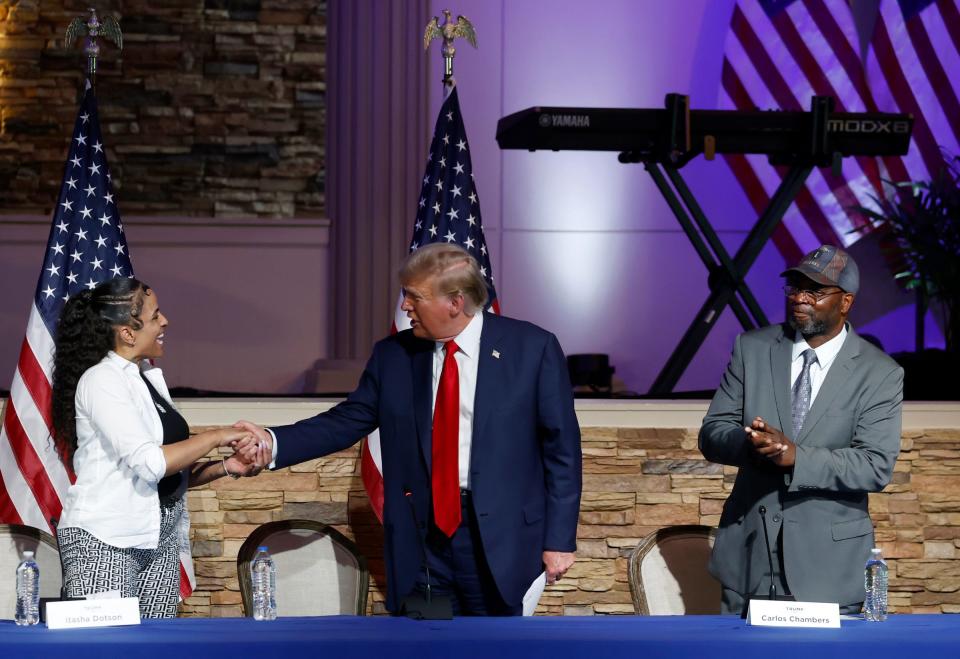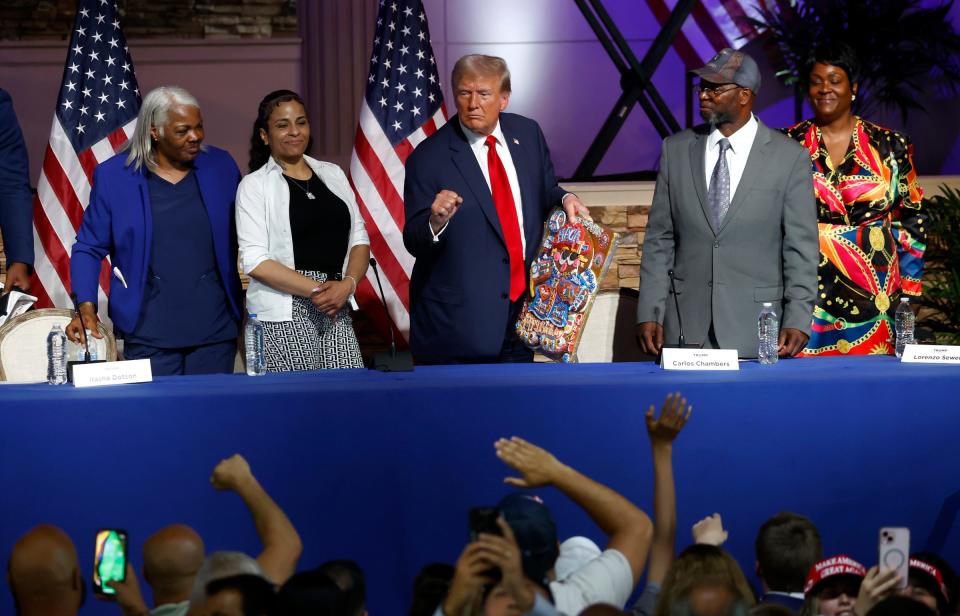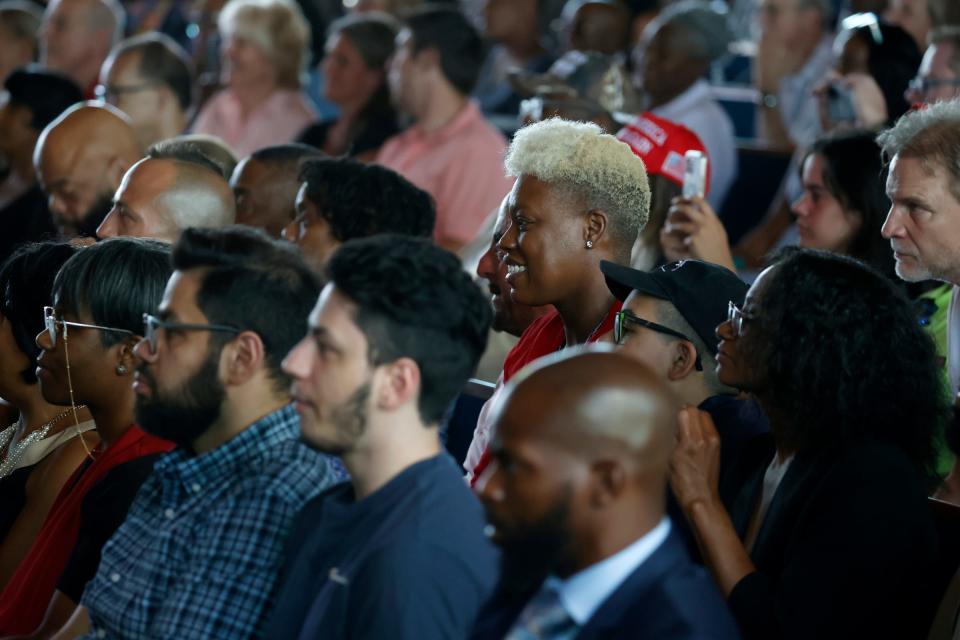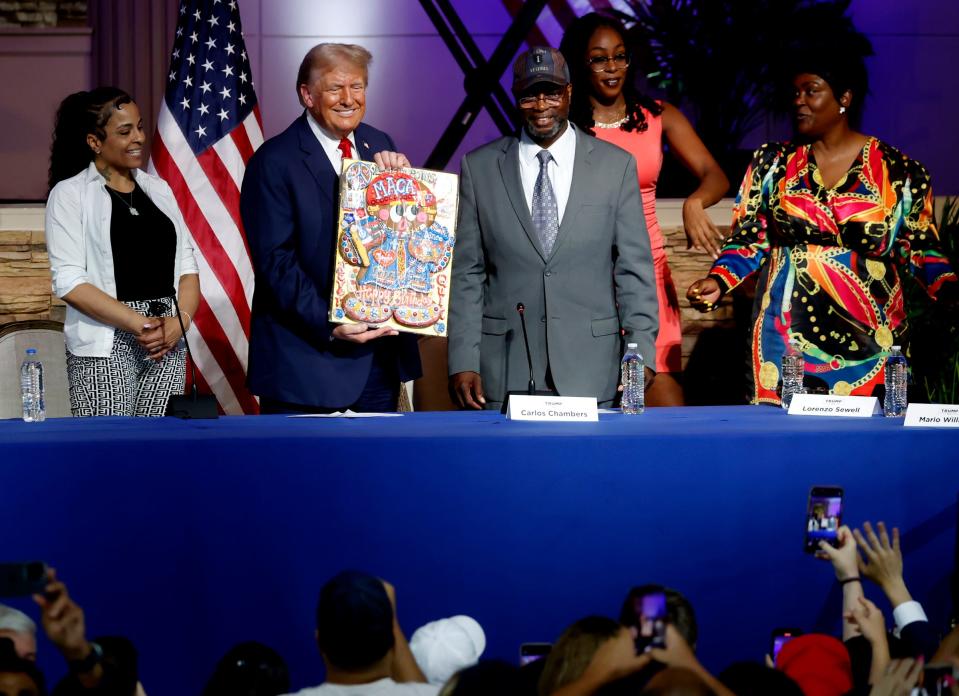At Detroit roundtable, Donald Trump pitches himself to Black voters over Joe Biden
Former President Donald Trump held a roundtable discussion in Detroit on Saturday, as his campaign attempts to court Black voters away from President Joe Biden in this year’s election.
Trump spoke about a myriad of topics in a speech that lasted around 20 minutes, including subjects he’s repeatedly addressed in his campaign, like inflation, Biden’s handling of the U.S. southern border with Mexico and his general opposition to an embrace of electric vehicles. Following the speech, a 20-minute roundtable discussion with small business owners and other community members moderated by U.S. Rep. Byron Donalds, R-Fla., took place.
But in a city he only received 5% of the vote in four years ago, he also pitched himself as a better choice for Black voters than Biden, telling a diverse crowd he would crack down on crime, improve the country’s economic outlook and in general, do more for Black Americans than Biden has.
The event, which drew hundreds of people, took place at 180 Church in Detroit. Along with Trump, high-profile figures including U.S. Rep. John James, R-Shelby Township; former Police Chief James Craig; Detroit rapper Sada Baby; and others were in attendance. 180 Church is a nondenominational congregation on Detroit’s west side just off Grand River Avenue near Schoolcraft Road.
“I knew I should be here,” Trump said as he greeted the crowd. “I’m honored to be in Detroit.”
Trump said crime, particularly in neighborhoods like the west side one he visited Saturday, would decrease if he returned to the White House. Data recently released by the FBI shows violent crime decreased in the U.S. in 2021 and 2022, after reaching higher levels in 2020. In Michigan, violent crime increased from 2020 to 2021, but decreased below those years in 2022, the data shows.
“The crime is most rampant right here and in African American communities,” he said. “More people see me, and they say, ‘Sir, we want protection, we want the police to protect us.'”

Trump also took aim at the Violent Crime Control and Law Enforcement Act of 1994, commonly referred to as the 1994 crime bill. Biden, then a U.S. senator, sponsored the bill now seen by some as a driver of mass incarceration in the U.S., according to the Brennan Center for Justice. Biden, in 2020, said it was a mistake to support the bill, although he said the bill was a product of its time.
Speakers at the event said a second Trump presidency presented more economic opportunity for Black Americans. “For the first time, Black men felt like they had access” in Trump’s first term, said Martell Bivings, a Republican candidate for Michigan’s 13th Congressional District.
Lorenzo Sewell, senior pastor of 180 Church, said he was humbled by Trump’s visit.
“President Obama never visited the 'hood,” Sewell said. “President Biden came to the big NAACP dinner, but he never came to the hood.”
James, Michigan’s only Black congressman, said despite recent major events like the NFL draft or the reopening of Michigan Central Station taking place in Detroit, residents in the city's neighborhoods are worse off than they were four years ago.

Biden's campaign has argued the opposite – it pointed to White House publications stating Black-owned small businesses are starting up at the fastest rate in decades and the unemployment rate among Black Americans has reached historic lows.
The campaign blasted Trump’s visit as a “political stunt.” In a statement released by the campaign, James Perkins, pastor of Detroit’s Greater Christ Baptist Church, said: “Donald Trump has the nerve to waltz into our city and act like he wants to understand the struggles Black Detroiters face, but the reality is he doesn’t care.”
The Biden campaign also held an event in Detroit on Friday that included speakers like Lt. Gov. Garlin Gilchrist and U.S. Sen. Debbie Stabenow, D-Lansing. Gilchrist criticized Trump for speaking in Detroit, a city Trump openly called “corrupt” in the aftermath of the 2020 presidential election.

Michigan is expected to be a key state once again in this year’s presidential contest, and the campaigns of both Trump and Biden see the state’s electoral votes as attainable – Biden defeated Trump by more than 154,000 votes in Michigan in 2020, but Trump won Michigan by around 10,000 votes in 2016 when he upset Hillary Clinton to win the presidency that year.
Exit polling in 2020 showed Biden receiving strong support from Black voters in Michigan, and election results show Biden received 94% of the vote in Detroit, Michigan’s largest city. But recent opinion polling indicated enthusiasm for Biden among Black voters in Michigan is lagging compared with four years ago. A recent New York Times/Siena College poll said Biden's support among Black voters in Michigan topped out at 60%, compared with 30% for Trump in a head-to-head matchup.
Even if Biden still receives support from a large chunk of the Black voters who go to the polls this November in Michigan, he could have problems if there is lower turnout among the voting bloc. Biden has repeatedly said that Black voters powered him to his 2020 win, including when he spoke at the NAACP Freedom Dinner in Detroit last month.
On the same day of his Detroit visit, Trump’s campaign announced it was launching the “Black Americans for Trump coalition,” and touted endorsements from celebrities, elected officials and other prominent figures, including former Detroit Mayor Kwame Kilpatrick. Trump commuted Kilpatrick’s 28-year prison sentence for public corruption crimes in 2021.
Trump has frequented Michigan in recent months – making stops in Grand Rapids, Freeland and Waterford since the turn of the year. But Saturday’s visit is believed to be Trump’s first stop at a Detroit church since 2016, when he spoke at Great Faith Ministries International. It also marked Trump’s first stop in Michigan since a jury in New York convicted the former president on 34 felony counts in an unprecedented hush money trial.
In addition to the roundtable, Trump also delivered the keynote address at a convention held by Turning Point Action at Huntington Place on Saturday.
A clearly ebullient Trump spoke for an hour and 20 minutes before “The People’s Convention,” a weekend-long gathering in Detroit arranged by Turning Point Action, a conservative grass roots group founded by activist Charlie Kirk.
Following speeches by Dr. Ben Carson, Trump’s former Housing and Urban Development Secretary, Georgia U.S. Rep. Marjorie Taylor Greene and others, Trump joked about his hair, efforts to produce “environmentally friendly” tanks and aircraft to send to war zones, and his wife asking him if he had gained weight while delivering his standard stump speech blasting “Crooked Joe” Biden for high inflation, overseas wars, a broken border and more.
He also hounded what he and other Republicans call a Biden administration “mandate” to force American automakers to sell more electric vehicle. Trump said he not only would put an end to it, he would also, “Bring back the (American) auto industry at a level that is greater than it was 30 years ago.”
Trump also said he’s not worried about getting enough votes to win, saying he’s only concerned about voter fraud, repeating false claims about the 2020 election, which he lost to Biden, being rigged. But he didn’t make any connection between where he was giving the speech and the ballot count in 2020. Detroit’s ballots were counted in Huntington Place and Trump has often made specious claims about mysterious ballots being delivered there in the middle of the night to cost him the election.
At one point the crowd chanted “Happy Birthday” to the president, who turned 78 on Friday.
At the end, he stood on stage before the adoring crowd as music played, raising his hand and shimmying in delight.
Along with supporters at 180 Church and downtown for Trump's Turning Point speech, a boat parade was also organized for Saturday — supporters pocked Lake St. Clair with red, white and blue through the afternoon. What appeared to be about a few hundred boats, decked out in American flags and Trump 2024 banners, sailed along the shoreline from Nine Mile Tower in St. Clair Shores toward Hart Plaza. Supporters on land planted near the shore to watch the flotilla sail by, or joined a parallel parade driving alongside the boats on Lake Shore Drive.“We’re celebrating President Trump, Trump’s birthday, Fathers Day, unity in the community,” said Rob Cortis, a Livonia man who mans a repurposed ambulance with an attached trailer hauling “Trump” spelled out in massive letters. “We want to put America first, we want to put the working man first and put the people first,” said Cortis.

Detroit is one of the nation’s largest majority-Black cities, and Trump carving into Biden’s share of votes in the city – he gained two percentage points from the 2016 election to the 2020 election – could factor into Trump potentially winning the state again.
Trump has denigrated Detroit in the past, including after the 2020 election when he called the city “corrupt” and falsely claimed there were more votes than voters in Detroit. Following the election that year, he blasted the vote-counting process inside Huntington Place (then called TCF Center) where election workers counted absentee ballots.
Free Press data intern Carmela Guaglianone contributed to this story.
Contact Arpan Lobo: [email protected]. Contact Todd Spangler: [email protected]. Follow him on Twitter@tsspangler.
This article originally appeared on Detroit Free Press: Trump campaigns to Black voters in Detroit at roundtable discussion
